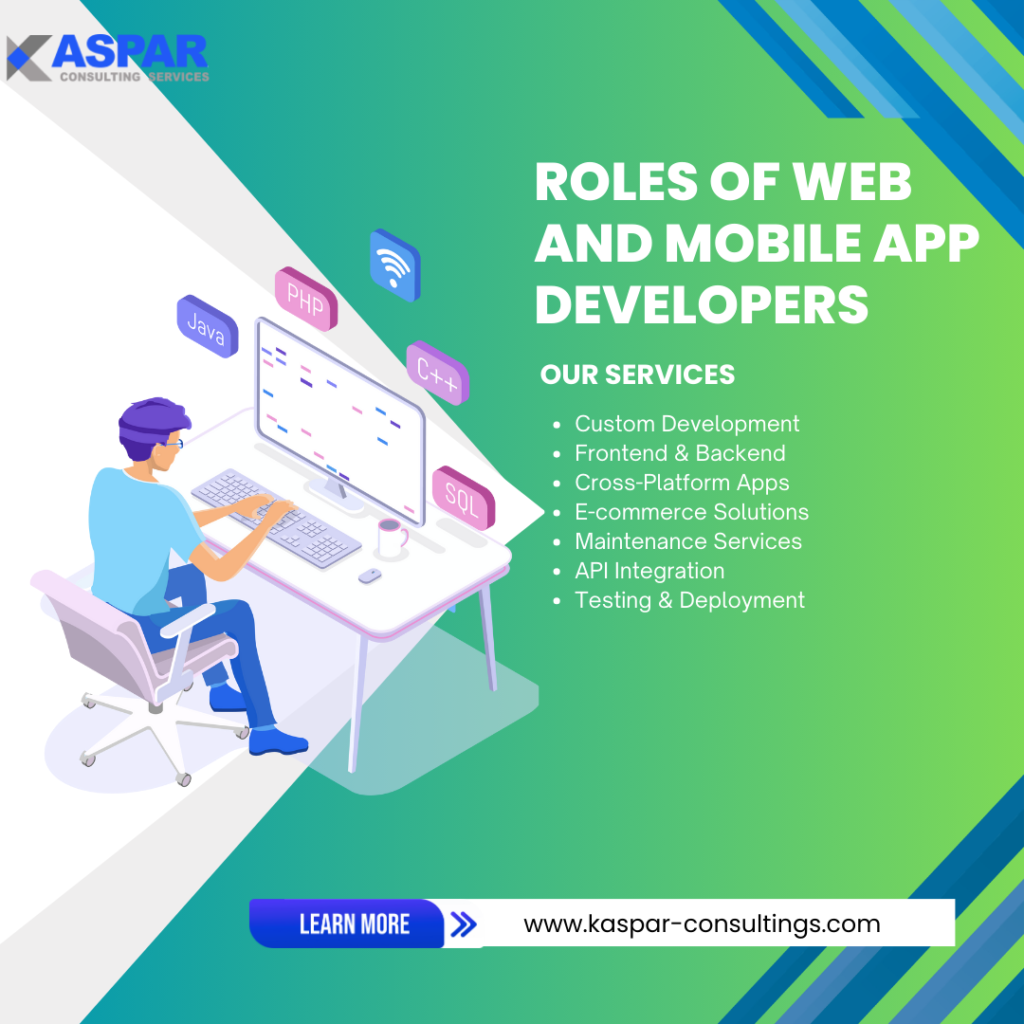
In an era dominated by digital interactions, web and mobile applications serve as the backbone of businesses, communication, and day-to-day activities. From shopping online to managing finances or staying connected through social media, these apps are deeply ingrained in our lives. At the heart of these digital solutions are skilled web and mobile app developers, professionals responsible for crafting applications that are fast, functional, and user-friendly.
Why Web and Mobile Apps Are Indispensable
Web and mobile apps have transformed how businesses operate and interact with their customers. Companies can no longer afford to rely solely on traditional brick-and-mortar strategies; they need a robust digital presence to thrive in today’s competitive market. Web apps drive online platforms, while mobile apps provide users with the convenience of accessing services directly from their smartphones, tablets, or other devices.
With over 4.9 billion internet users worldwide and 6.8 billion smartphone users, the demand for high-quality, scalable, and secure web and mobile applications is at an all-time high.In addition to Growing Demand for Web and Mobile App Developers
1. Accelerated Digital Transformation
As industries embrace digital transformation, businesses are investing heavily in online solutions to improve efficiency, reduce costs, and provide personalized customer experiences. Web and mobile app developers are the driving force behind this shift, thus creating tailored solutions for e-commerce, education, healthcare, and more.
2. Dominance of Mobile Technology
Smartphones have become the primary device for internet access, with mobile apps accounting for over 70% of digital time spent by users. Businesses are focusing on delivering seamless mobile experiences, increasing the demand for mobile app developers who specialize in platforms like iOS, Android, or cross-platform technologies like Flutter and React Native.
3. Rise of E-Commerce and Remote Work Tools
The global boom in e-commerce and the shift to remote work have further amplified the need for skilled developers. Platforms such as Amazon, Shopify, Zoom, and Slack rely on web and mobile developers to innovate and maintain their performance, ensuring they remain competitive in a crowded market.
4. Changing Consumer Expectations
Today’s users expect apps to be intuitive, fast, and visually engaging. To meet these demands, developers integrate advanced technologies like AI-powered features, augmented reality, and machine learning algorithms into apps. Meeting these expectations requires not only technical expertise but also a deep understanding of user behavior.
Web and Mobile App Developers: The Pillars of Digital Success
Web and mobile app developers are more than just programmers—they are the architects of the digital world. Their expertise lies in crafting solutions that not only function efficiently but also deliver a seamless user experience. Developers ensure that apps remain secure, scalable, and optimized to meet the demands of modern consumers.
Section 1: Understanding Web and Mobile App Development
What is Web Development?
Web development is the process of creating, designing, and maintaining websites and web applications that run on internet browsers. The ultimate goal is to ensure a functional, visually appealing, and also user-friendly experience for visitors.
Definition and Scope
Web development can be broadly categorized into three areas:
- Frontend Development: This involves crafting the visual and interactive components of a website, ensuring users can navigate seamlessly. Moreover, The focus is on creating intuitive and engaging interfaces.
- Backend Development: This area manages server-side operations, databases, and business logic, ensuring the website runs smoothly behind the scenes.
- Full-Stack Development: Full-stack developers are skilled in both frontend and backend processes, making them versatile professionals who can handle end-to-end development.
Key Technologies Used in Web Development
Web developers leverage a wide range of tools and technologies, including:
- HTML (HyperText Markup Language): The backbone of any website, HTML structures the content using predefined tags like headings, paragraphs, and links.
- CSS (Cascading Style Sheets): This adds design elements, such as colors, fonts, layouts, and animations, making the site visually appealing.
- JavaScript: Essential for interactivity, JavaScript powers dynamic features like dropdown menus, carousels, and real-time updates. Popular frameworks include React.js, Angular, and Vue.js.
- Backend Tools: Technologies like Node.js, Django, Ruby on Rails, and Laravel manage databases, authentication, and server-side logic.
What is Mobile App Development?
Mobile app development involves creating software applications that run on mobile devices such as smartphones, tablets, and wearable technology. These apps are typically designed for specific operating systems like iOS or Android, or developed using cross-platform technologies to work on multiple platforms.
Definition and Scope
Mobile app development covers two main types of apps:
- Native Apps: These are built for a specific operating system using native programming languages, such as Swift or Objective-C for iOS and Java or Kotlin for Android. Native apps are optimized for platform-specific performance and functionality.
- Cross-Platform Apps: These are developed using frameworks like Flutter, React Native, and Xamarin, enabling a single codebase to function across multiple platforms. They offer faster development cycles and also cost efficiency.
Mobile apps have applications across diverse industries, including healthcare, finance, e-commerce, and entertainment, making them indispensable tools for businesses to reach and engage their audience.
Platforms and Frameworks in Mobile App Development
- iOS Development: Focused on Apple’s ecosystem, iOS apps are distributed via the App Store and are known for their high performance, robust security, and premium user experience.
- Android Development: Android is the most widely used mobile operating system globally. Its apps are distributed via the Google Play Store, offering access to a massive audience.
- Cross-Platform Development: Cross-platform frameworks like Flutter and React Native allow businesses to reach both iOS and Android users while saving on development time and costs.
Performance Optimization and Device Compatibility
One of the key aspects of mobile app development is ensuring optimal performance. This includes:
- Minimizing load times: Apps must load quickly and run smoothly to retain users.
- Battery and memory efficiency: Apps should not drain battery life or consume excessive device resources.
- Compatibility: Apps must function seamlessly across a wide range of devices, screen resolutions, and also operating system versions.
Section 2: Roles and Responsibilities of Web Developers
Web development is a vital component of the digital world, responsible for creating functional and aesthetically pleasing websites. Developers typically specialize in one of three key roles: frontend development, backend development, and full-stack development. Each plays an essential part in building modern websites and web applications.
Frontend Development: Creating Visually Appealing and Interactive Interfaces
Frontend development focuses on the client-side of a website or web application. This role involves the creation of the visual elements that users interact with directly. It’s all about making a website user-friendly and visually attractive while ensuring smooth functionality.
Key Responsibilities of Frontend Developers:
- Design and Layout Creation: Frontend developers bring to life website designs based on wireframes and prototypes. They convert design mockups (often created by UI/UX designers) into functional, responsive webpages using HTML, CSS, and JavaScript.
- Responsive Web Design: Frontend developers ensure websites are mobile-friendly and adapt to various screen sizes (smartphones, tablets, desktops) through responsive design principles. Moreover, they use media queries and flexible grid layouts to optimize user experiences across devices.
- Interactivity and User Experience (UX): By implementing JavaScript and libraries like React or Vue.js, frontend developers make websites interactive. This includes adding features such as dynamic content updates, form validations, and smooth animations that enhance user engagement.
Backend Development: Building Server-Side Logic and Managing Data
Backend development focuses on the server-side of web development. It deals with how the website functions behind the scenes, including how data is stored, processed, and delivered to the user. Backend developers are responsible for creating the systems and logic that power a website or web application.
Key Responsibilities of Backend Developers:
- Server-Side Logic: Backend developers write code that processes requests from the frontend and sends data back to the user. They work with programming languages like Python, Ruby, PHP, Node.js, and Java, among others, to create complex business logic.
- Database Management: Backend developers manage databases that store essential data, such as user information, product details, or transaction history. They work with databases like MySQL, PostgreSQL, or MongoDB in addition to ensure smooth data retrieval and storage.
- API Development: Many modern websites rely on APIs (Application Programming Interfaces) to interact with external services or databases. Backend developers create APIs that allow different applications to communicate effectively. For example, an e-commerce site might integrate payment gateways through an API.
- Security Protocols: Backend developers implement security measures to protect websites from vulnerabilities. This includes securing data transfer with SSL/TLS encryption, creating secure login systems with OAuth or JWT tokens, and preventing SQL injection or cross-site scripting (XSS) attacks.
Full-Stack Development: Bridging the Gap Between Frontend and Backend
Full-stack developers are versatile professionals who work on both the frontend and backend of a website or web application. They possess a broad range of skills and knowledge, allowing them to handle both the client-side and server-side elements of web development.
Key Responsibilities of Full-Stack Developers:
- Bridging Frontend and Backend: Full-stack developers handle both the user interface (UI) and the server-side architecture, ensuring that the frontend and backend work together seamlessly. They use a variety of tools and frameworks to build end-to-end solutions.
- Versatility in Technologies: Full-stack developers are proficient in a wide range of technologies. They may work with frontend tools like React or Angular, alongside backend frameworks such as Node.js, Express, or Django.
- End-to-End Project Management: Full-stack developers are often involved in the entire lifecycle of a web development project, from initial design and planning to testing, deployment, and maintenance. They handle multiple layers of a project, making them valuable team members in agile development environments.
- Collaboration with Designers and Other Developers: Full-stack developers play a key role in collaborating with UI/UX designers and other backend or frontend developers. They ensure that the final product meets user needs, is functional, and has a seamless experience across all devices.
Section 3: Roles and Responsibilities of Mobile App Developers
Mobile app development is a dynamic field, with different types of developers playing crucial roles in creating robust mobile applications. Whether developing native or cross-platform apps, each type of developer brings unique skills and responsibilities to the table.
Native App Developers
Native app developers specialize in building applications for specific mobile operating systems, such as iOS or Android. These developers use platform-specific programming languages to ensure optimal performance, responsiveness, and integration with the device’s hardware. Here are the key responsibilities:
- Proficiency in Platform-Specific Languages:
Native developers are well-versed in languages such as Swift for iOS and Kotlin or Java for Android. These languages are tailored to the unique functionalities of their respective platforms, enabling developers to create high-performance apps with native-like experiences. - Adherence to Platform Design Guidelines:
Each mobile operating system has its own design principles. For instance, iOS has Human Interface Guidelines, while Android follows Material Design.
Cross-Platform Developers
Cross-platform mobile app development allows developers to build apps that work across multiple platforms (iOS, Android, etc.) using a single codebase. This approach saves time and resources, particularly for startups and businesses with limited budgets.
- Utilizing Frameworks like Flutter and React Native:
Cross-platform developers rely on frameworks such as Flutter (developed by Google) and React Native (created by Facebook) to write code once and deploy it on multiple platforms. These frameworks offer significant time savings and cost efficiency by allowing code reuse across platforms. - Benefits of Cost-Efficiency and Faster Development Cycles:
The main advantage of cross-platform development is the ability to deliver apps more quickly and at a lower cost compared to native development. By using a single codebase for both iOS and Android, businesses can launch their apps sooner and allocate resources more efficiently.
Focus on Testing and Deployment
Whether developing a native or cross-platform app, testing and deployment are vital steps in the app development lifecycle.
- Ensuring App Functionality Through Rigorous Testing:
Testing ensures that the app performs well, is free of bugs, and provides an excellent user experience. Developers conduct various types of testing, including unit testing, integration testing, and user acceptance testing (UAT), to identify issues before deployment. - App Store Submission and Post-Launch Updates:
Once an app passes the testing phase, the next step is submission to app stores (Apple App Store for iOS or Google Play Store for Android). After the app is live, developers continue to monitor its performance, gather feedback from users, and push updates to fix bugs or add new features.
Section 4: Overlapping Roles and Key Skills
In the world of app development, collaboration between web and mobile developers is becoming increasingly important. Both types of developers often work together to ensure that the app’s functionality and user experience align across platforms.
Collaboration Between Web and Mobile Developers
Developers who specialize in both areas, known as full-stack developers, play a critical role in bridging gaps and ensuring consistency across different platforms. Web and mobile developers may collaborate on shared features, APIs, or server-side components.
- Shared Skills:
Both web and mobile developers rely on a set of core skills, such as problem-solving, teamwork, and communication. These developers must be able to quickly adapt to new technologies and workflows and work in tandem to ensure that apps function seamlessly across all devices. - Understanding User Requirements:
Regardless of whether developing for the web or mobile, both types of developers need to have a deep understanding of user needs. This includes designing user-friendly interfaces, ensuring fast loading times, and optimizing performance for different devices and screen sizes.
Importance of Staying Updated with the Latest Tools and Technologies
The field of app development evolves quickly, with new tools, languages, and frameworks emerging regularly. Developers must stay current to remain competitive in the industry. By staying updated with the latest trends and technologies, developers can:
- Adopt the Most Efficient Tools:
Using the latest frameworks, libraries, and tools can significantly improve productivity and code quality. For example, Flutter’s updates and new features allow developers to create high-quality apps faster, while React Native continues to evolve with better performance and functionality. - Ensure Competitive Edge:
Staying on top of emerging technologies like artificial intelligence (AI), machine learning (ML), and augmented reality (AR) can give developers a competitive edge in the industry. These technologies are increasingly integrated into mobile apps, providing a unique experience for users.
Section 5: Challenges Faced by Developers in Web and Mobile Development
- Keeping Up with New Technologies
The tech world moves fast, and developers need to keep up with constantly changing tools, programming languages, and frameworks. Technologies like AI, machine learning, and blockchain are shaping the future of web and mobile apps.
Balancing Performance, Security, and Scalability
Developers often need to strike a balance between three critical factors:
- Performance: Making apps fast and responsive for users.
- Security: Protecting apps from cyberattacks and ensuring data safety.
- Scalability: Ensuring apps can handle growth, like more users or larger datasets.
These goals can sometimes conflict. For instance, improving speed might weaken security, or adding security might slow down performance. Developers need to plan carefully to achieve all three.
- Meeting Deadlines and Client Expectations
Developers frequently work under tight deadlines and face high expectations from clients. Changes or additional features requested late in the project can cause delays and put pressure on the team.
Section 6: Why Choose Kasper for Web and Mobile Development?
- Why Kaspar?
Kaspar specializes in creating powerful, secure, and scalable web and mobile applications tailored to your needs. We use the latest technologies and frameworks to ensure your project stays ahead of the competition. Whether you need a custom website, a mobile app, or an enterprise solution, Kaspar’s expert developers are ready to help you succeed. - Success Stories from Our Clients
Kaspar’s work has helped businesses grow:- E-commerce Client: Improved user engagement by 30% with a new mobile shopping app.
- Financial Services Client: Increased efficiency by 40% with a custom-built web app.
- These examples show Kaspar’s ability to deliver real, measurable results.
- Join the Kasper Network
- For Businesses: Partner with Kaspar to build custom solutions that drive growth, improve user experiences, and make your operations more efficient. We work closely with you to meet your goals.
- For Developers: If you’re passionate about technology and want to work on exciting projects, join Kasper! We offer a supportive, innovative workplace, career development opportunities, and competitive benefits.
- Contact Us
- Website: Visit www.kaspar.com to see our work and learn more.
- Email: Reach out at contact@kaspar.com for projects or job opportunities.
- Phone: Call us at (555) 123-4567 to discuss how we can help.
- Social Media: Follow us on LinkedIn for updates on projects and job openings.
Conclusion
The Importance of Web and Mobile App Development
- Why Web and Mobile App Developers Matter
Web and mobile app developers are essential for creating the digital tools that help businesses grow. They build websites and apps that are easy to use, fast, and secure. With their expertise, developers make sure businesses can meet the needs of their customers, improve processes, and stay ahead of the competition. Without skilled developers, businesses would struggle to deliver the digital experiences that users expect. - The Power of Collaboration and Innovation in Tech
In the tech world, innovation and collaboration are key to success. By working together, developers, businesses, and other teams create new solutions that improve user experiences and solve real-world problems. Keeping up with the latest technologies like AI, cloud computing, and mobile app development helps businesses stay competitive and grow in the digital age. Collaboration ensures that each project is done right and that businesses achieve their goals. - Kaspar: Your Trusted Development Partner
Kaspar is here to help businesses succeed by providing expert web and mobile development services. Our experienced developers work closely with clients to create secure, scalable, and high-performing digital solutions. We focus on innovation and collaboration to ensure that every project meets your needs. Whether you need a custom website, a mobile app, or an enterprise solution, Kaspar is the trusted partner that can bring your ideas to life.
Why Work with Kaspar?- Proven success with businesses across various industries.
- Expertise in the latest web and mobile development technologies.
- A collaborative approach to ensure your vision is achieved.
- Commitment to delivering high-quality, secure solutions.




